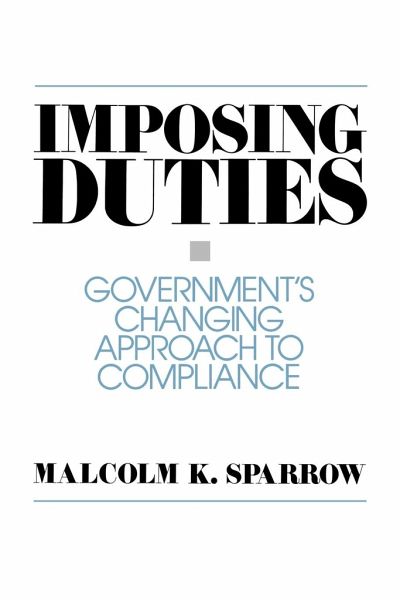
Imposing Duties
Government's Changing Approach to Compliance
Versandkostenfrei!
Versandfertig in 1-2 Wochen
44,99 €
inkl. MwSt.
Weitere Ausgaben:

PAYBACK Punkte
22 °P sammeln!
Policing, environmental protection, and tax administration have much more in common than practitioners in these areas often recognize. Their cultures and traditions have, for the past few decades, incorporated a classic enforcement mentality, based on the underlying assumption that a ruthless and efficient investigative and enforcement capability would produce compliance through the mechanisms of deterrence. In these fields, and perhaps in many other enforcement or compliance oriented professions, Sparrow believes the traditional enforcement approach is under stress. There are too many violato...
Policing, environmental protection, and tax administration have much more in common than practitioners in these areas often recognize. Their cultures and traditions have, for the past few decades, incorporated a classic enforcement mentality, based on the underlying assumption that a ruthless and efficient investigative and enforcement capability would produce compliance through the mechanisms of deterrence. In these fields, and perhaps in many other enforcement or compliance oriented professions, Sparrow believes the traditional enforcement approach is under stress. There are too many violators, too many laws to be enforced, and not enough resources to get the job done. In this book, Sparrow draws out remarkable parallels in the ways these professions are adapting to meet their current challenges, as they reject their traditional reliance on retrospective, case-by-case, after-the-fact enforcement. Rather than perpetuating their dependence on processes, procedures, and coverage, these professions are each developing new capacities for analyzing important patterns of noncompliance, prioritizing risks, and designing intelligent interventions using a much broader range of tools. Sparrow extracts the essence of the transformations underway, explores the critical implications for information management, and lays out the issues that need resolution before the emerging compliance strategies can reach maturity. This book is required reading for all those concerned with either the theory or the practice of the compliance side of government.














